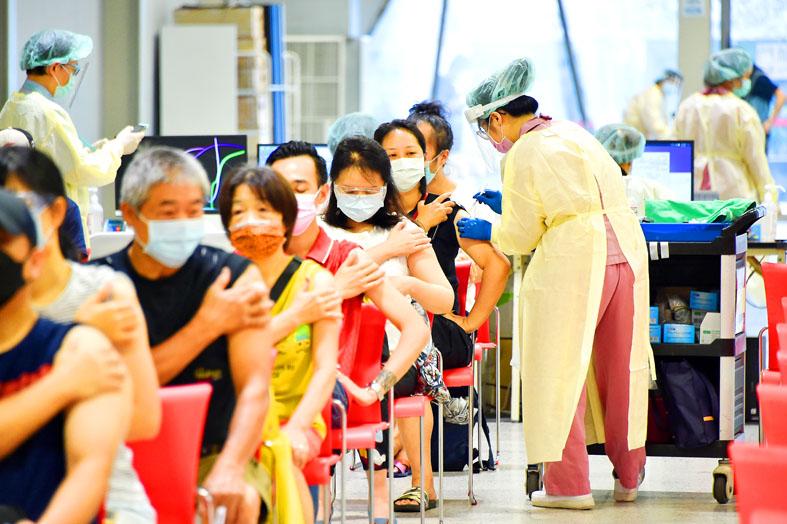The Taipei City Government is considering buying COVID-19 vaccines and is to meet within a week to discuss the issue, it said yesterday.
Although the central government has nominally obtained 75 million doses of COVID-19 vaccines, either through purchase agreements or donations, only 9.5 million doses have arrived in Taiwan, Taipei Deputy Mayor Tsai Ping-kun (蔡炳坤) said.
The city government is considering purchasing its own supply of vaccines, as it might need to provide residents with booster shots to better protect them against SARS-CoV-2 variants, Tsai said.

Photo: Tu Chien-jung, Taipei Times
Such an acquisition would cost at least NT$6 billion (US$215.7 million), he said.
If the Taipei City Government decides to buy vaccines, it — and subsequent matters such as the number of doses needed — would be deliberated and ratified by the city council, he added.
The city government must also consider the efficacy of a booster shot and a potential backlash from residents should the central government seek to expropriate any vaccines the city purchased with its own funds, Tsai said.
The Taipei City Government would meet within a week and invite experts to assess the situation, he said, adding that the assessment would be used to make a final decision.
Last month, local media reported that the city government could acquire vaccines through collaboration with a large hospital in central Taiwan facilitated by Tsai; by purchasing Novavax COVID-19 vaccines, which would be facilitated by Taiwan People’s Party member Chou Chung-chi (周鐘麒); or through collaborations with pharmaceutical companies of a certain size and the Taipei Department of Health.
Tsai said that the city government could obtain vaccines through one of those methods, but that funding and other issues must be dealt with first.

POSITIVE DEVELOPMENT: Japan and the US are expected to hold in-depth discussions on Taiwan-related issues during the meeting next month, Japanese sources said The holding of a Japan-US leaders’ meeting ahead of US President Donald Trump’s visit to China is positive news for Taiwan, former Japan-Taiwan Exchange Association representative Hiroyasu Izumi said yesterday. After the Liberal Democratic Party’s landslide victory in Japan’s House of Representatives election, Japanese Prime Minister Sanae Takaichi is scheduled to visit the US next month, where she is to meet with Trump ahead of the US president’s planned visit to China from March 31 to April 2 for a meeting with Chinese President Xi Jinping (習近平). Japan and the US are expected to hold in-depth discussions on Taiwan-related issues during the

‘LIKE-MINDED PARTNER’: Tako van Popta said it would be inappropriate to delay signing the deal with Taiwan because of China, adding he would promote the issue Canadian senators have stressed Taiwan’s importance for international trade and expressed enthusiasm for ensuring the Taiwan-Canada trade cooperation framework agreement is implemented this year. Representative to Canada Harry Tseng (曾厚仁) in an interview with the Central News Agency (CNA) said he was increasingly uneasy about Ottawa’s delays in signing the agreement, especially as Ottawa has warmed toward Beijing. There are “no negotiations left. Not only [is it] initialed, we have three versions of the text ready: English, French and Mandarin,” Tseng said. “That tells you how close we are to the final signature.” Tseng said that he hoped Canadian Prime Minister Mark Carney

President William Lai (賴清德) yesterday bestowed one of Taiwan’s highest honors on Saint Vincent and the Grenadines (SVG) Ambassador Andrea Clare Bowman in recognition of her contributions to bilateral ties. “By conferring the Order of Brilliant Star with Grand Cordon on Ambassador Bowman today, I want to sincerely thank her, on behalf of the Taiwanese people, for her outstanding contribution to deepening diplomatic ties between Taiwan and SVG,” Lai said at a ceremony held at the Presidential Office in Taipei. He noted that Bowman became SVG’s first ambassador to Taiwan in 2019 and

A man walks past elementary school artworks at the Taipei Lantern Festival in Ximen District yesterday, the first day of the event. The festival is to run from 5pm to 10pm through March 15.